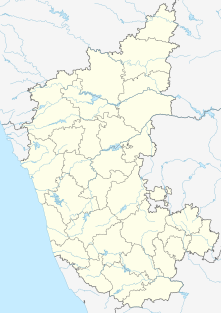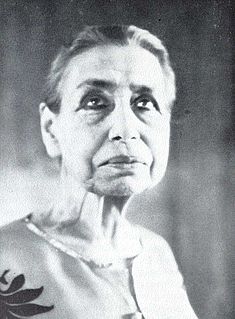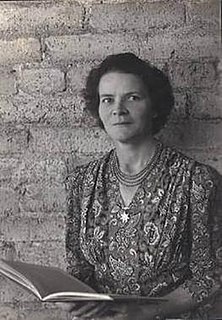| Mangesh Vithal Nadkarni | |
|---|---|
 | |
| Born | 6 March 1933 Kodibag, Karwar, Uttar Kannada, Karnataka |
| Died | 23 September 2007 Pondicherry, India |
| Occupation | Professor, and a disciple of Sri Aurobindo |
| Spouse(s) | Meera Mallapur |
| Parent(s) | Vithal Nadkarni and Indira Kaushik |
Mangesh V. Nadkarni (1933–2007) was a professor of English literature, and a disciple of Sri Aurobindo. He lectured on Sri Aurobindo's philosophy and vision [1]

Professor is an academic rank at universities and other post-secondary education and research institutions in most countries. Literally, professor derives from Latin as a "person who professes" being usually an expert in arts or sciences, a teacher of the highest rank.

An apprenticeship is a system of training a new generation of practitioners of a trade or profession with on-the-job training and often some accompanying study. Apprenticeship also enables practitioners to gain a license to practice in a regulated profession. Most of their training is done while working for an employer who helps the apprentices learn their trade or profession, in exchange for their continued labor for an agreed period after they have achieved measurable competencies. Apprenticeships typically last 3 to 7 years. People who successfully complete an apprenticeship reach the "journeyman" or professional certification level of competence.

Sri Aurobindo was an Indian philosopher, yogi, guru, poet, and nationalist. He joined the Indian movement for independence from British rule, for a while was one of its influential leaders and then became a spiritual reformer, introducing his visions on human progress and spiritual evolution.
Contents
Mangesh V. Nadkarni was born in Kodibag and raised in Bankikkodla. At Bankikodla, literature, folk art, spiritual lore, music and sports kept him enthralled during his school days. Mangesh completed his high school diploma (1948–49) from the A. H. School, Bankikodla. His teachers in high school gave impetus to his imagination and taught him to perceive the sheer excitement of ideas, leading him to the path of his inner quest. Sundar Nadkarni a Karnataka Sahitya Akademi winner was Mangesh's younger brother.

Bankikodla-Hanehalli are twin neighbouring villages in a valley in Uttara Kannada district in the south western section of the Indian state of Karnataka.

Ananadasharm High School, one of the oldest high schools in Uttar Kannada, was a private school located in Bankikodla-Hanehalli. The school was funded by M.N.Kulakrni, A. Kagal, D. M. Nadkarni and Datta master (Nadkarni) Chitrapur Saraswat Brahmins from Bankikodla-Hanehalli and the local people. Kulkarni was a press owner in Mumbai and Datta master was the Headmaster of the English middle school then in Bankikodla. Later the school was converted to a high school in 1943. The school is now supported by the Karnataka state government.
Nadkarni completed his M.A. in English literature from Rajaram College, Kolhapur, and began his teaching career in Rajkot. Later, he moved to Anand where he was a lecturer of English at Nalini Arvind & T.V. Patel Arts College. During his college career, Nadkarni was a student of professor V.K. Gokak who influenced Nadkarni towards Sri Aurobindo’s philosophy. Mangesh earned his Ph.D. in Phonetics from the UCLA, and was a professor of linguistics at the Central Institute of English and Foreign Languages, Hyderabad. He later taught as a senior lecturer at the National University of Singapore (1985–93). During the course of his tenure, he guided Ph.D. candidates and published in theoretical and applied Linguistics journals.
Rajaram College, Kolhapur is a government college affiliated to Shivaji University in Kolhapur. It runs degree level courses in science, humanities, languages and arts and offers an MA in Psychology. It also has a popular junior college offering higher secondary education courses in science and arts.

Kolhapur is a historic city of Maharashtra. It is the district headquarters of Kolhapur district. Prior to Indian Independence, Kolhapur was a nineteen gun salute princely state ruled by the Bhosale Chhatrapati of the Maratha Empire.

Rajkot is the fourth-largest city in the state of Gujarat, India, after Ahmedabad, Surat and Vadodara and is in the centre of the Saurashtra region of Gujarat. Rajkot is the 35th-largest urban agglomeration in India, with a population of more than 1.8 million as of 2018(appx). Rajkot is the ninth-cleanest city of India, and is the 7th-fastest-growing city in the world as of March 2019. The city contains the administrative headquarters of the Rajkot District, 245 km from the state capital Gandhinagar, and is located on the banks of the Aji and Nyari rivers. Rajkot was the capital of the Saurashtra State from 15 April 1948 to 31 October 1956, before its merger with Bombay State on 1 November 1956. Rajkot was reincorporated into Gujarat State from 1 May 1960.






